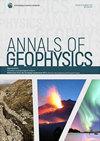Coordinated and Interoperable Seismological Data and Product Services in Europe: the EPOS Thematic Core Service for Seismology
IF 1.2
4区 地球科学
Q3 GEOCHEMISTRY & GEOPHYSICS
引用次数: 10
Abstract
In this article we describe EPOS Seismology, the Thematic Core Service consortium for the seismology domain within the European Plate Observing System infrastructure. EPOS Seismology was developed alongside the build-up of EPOS during the last decade, in close collaboration between the existing pan-European seismological initiatives ORFEUS (Observatories and Research Facilities for European Seismology), EMSC (Euro-Mediterranean Seismological Center) and EFEHR (European Facilities for Earthquake Hazard and Risk) and their respective communities. It provides on one hand a governance framework that allows a well-coordinated interaction of the seismological community services with EPOS and its bodies, and on the other hand it strengthens the coordination among the already existing seismological initiatives with regard to data, products and service provisioning and further development. Within the EPOS Delivery Framework, ORFEUS, EMSC and EFEHR provide a wide range of services that allow open access to a vast amount of seismological data and products, following and implementing the FAIR principles and supporting open science. Services include access to raw seismic waveforms of thousands of stations together with relevant station and data quality information, parametric earthquake information of recent and historical earthquakes together with advanced event-specific products like moment tensors or source models and further ancillary services, and comprehensive seismic hazard and risk information, covering latest European scale models and their underlying data. The services continue to be available on the well-established domain-specific platforms and websites, and are also consecutively integrated with the interoperable central EPOS data infrastructure. EPOS Seismology and its participating organizations provide a consistent framework for the future development of these services and their operation as EPOS services, closely coordinated also with other international seismological initiatives, and is well set to represent the European seismological research infrastructures and their stakeholders within EPOS.在本文中,我们描述了欧洲板块观测系统基础设施内地震学领域的专题核心服务联盟EPOS地震学。在过去十年中,在现有的泛欧地震学倡议ORFEUS(欧洲地震学观测和研究设施),EMSC(欧洲-地中海地震中心)和EFEHR(欧洲地震灾害和风险设施)及其各自社区之间的密切合作下,EPOS地震学随着EPOS的建立而发展。它一方面提供了一个管理框架,允许地震学社区服务与EPOS及其机构进行良好协调的互动,另一方面,它加强了现有地震学倡议之间在数据、产品和服务提供以及进一步发展方面的协调。在EPOS交付框架内,ORFEUS, EMSC和EFEHR提供广泛的服务,允许开放访问大量的地震数据和产品,遵循和实施FAIR原则并支持开放科学。服务包括访问数千个台站的原始地震波形以及相关台站和数据质量信息,最近和历史地震的参数地震信息以及高级事件特定产品,如矩张量或源模型和进一步的辅助服务,以及全面的地震危害和风险信息,涵盖最新的欧洲比例模型及其基础数据。这些服务继续在完善的特定领域平台和网站上提供,并与可互操作的中央EPOS数据基础设施连续集成。EPOS地震学及其参与组织为这些服务的未来发展及其作为EPOS服务的运作提供了一致的框架,并与其他国际地震学倡议密切协调,并很好地代表了欧洲地震学研究基础设施及其在EPOS中的利益相关者。
本文章由计算机程序翻译,如有差异,请以英文原文为准。
求助全文
约1分钟内获得全文
求助全文
来源期刊

Annals of Geophysics
地学-地球化学与地球物理
CiteScore
2.40
自引率
0.00%
发文量
38
审稿时长
4-8 weeks
期刊介绍:
Annals of Geophysics is an international, peer-reviewed, open-access, online journal. Annals of Geophysics welcomes contributions on primary research on Seismology, Geodesy, Volcanology, Physics and Chemistry of the Earth, Oceanography and Climatology, Geomagnetism and Paleomagnetism, Geodynamics and Tectonophysics, Physics and Chemistry of the Atmosphere.
It provides:
-Open-access, freely accessible online (authors retain copyright)
-Fast publication times
-Peer review by expert, practicing researchers
-Free of charge publication
-Post-publication tools to indicate quality and impact
-Worldwide media coverage.
Annals of Geophysics is published by Istituto Nazionale di Geofisica e Vulcanologia (INGV), nonprofit public research institution.
 求助内容:
求助内容: 应助结果提醒方式:
应助结果提醒方式:


